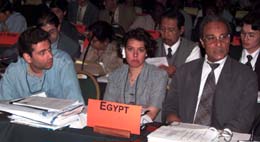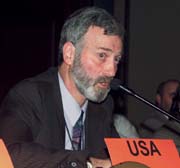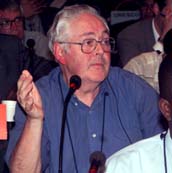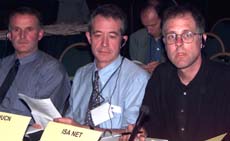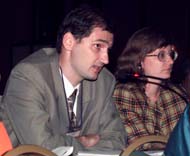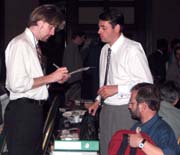 |
San José, Costa Rica 10-18 May 1999 |
|
Briefing |
|
Delegates at COP7
convened in Plenary to consider the reports of the technical sessions,
appoint the members of the STRP, and consider and adopt COP7 resolutions.
The Minister of the Environment of France made a special presentation. |
|
|
Reports of the Technical Sessions and the budget debate
|
Bill
Phillips, Deputy Secretary-General of the Ramsar Secretariat (pictured
on the far right), provided an overview of the five technical sessions.
He reported that drafting groups had revised the resolutions relevant
to each technical session to reflect amendments proposed by the regionally-based
discussion groups. He said the technical sessions were an innovative approach
that had considered 13 of COP7’s 32 draft resolutions.
|
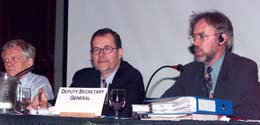 |
| EGYPT was among the delegations that strongly supported the 5-5-5 proposal. | |
|
On
behalf of the Neotropical Region, URUGUAY tabled two additional amendments,
recommending that the STRP’s composition reflect the different bio-geographic
characteristics represented in CPs and that STRP members, to the extent
possible, come from countries not represented in the SC.
|
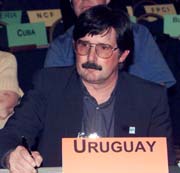 |
|
|
|
|
GERMANY
said it is not in favor of increasing the budgets of international organizations.
He noted that while a development officer would be advantageous, there
are other ways to raise the necessary funds, such as through payment of
dues owed by CPs.
|
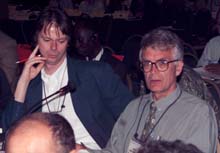 |
| IUCN introduced an amendment that the STRP provide “guidance on legislation” rather than “model legislation” on risk assessment, as each CP has its own particular national legal context. He also inserted text that urges CPs to “review existing legal and institutional measures” pursuant to the resolution on CP legislative and policy reviews on wetlands, prior to adopting legislation and programmes to prevent the introduction of alien species. | |
|
BIRDLIFE
INTERNATIONAL stressed the need to remain focused on what is transpiring
on the Ramsar sites themselves and invited CPs to discuss how COP8 can
adequately consider this issue.
|
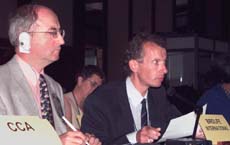 |
Miscellanous photos |
|
|
Dominique
Voynet, French Minister of the Environment, made a special presentation
to the Plenary. She discussed Ramsar’s significant role in the sustainable
development and conservation of wetlands, and outlined France’s Convention-related
activities at the national and international levels. She underscored wetlands’
essential role in renewing water resources and the potential for private
enterprise to contribute to the achievement of Ramsar’s objectives.
|
 |
| ENB's Chris Spence seeking clarification from the French delegation | |
|
|
 |
Back to ENB's Ramsar COP7 home page
© Earth Negotiations Bulletin, 1999. All rights reserved.
